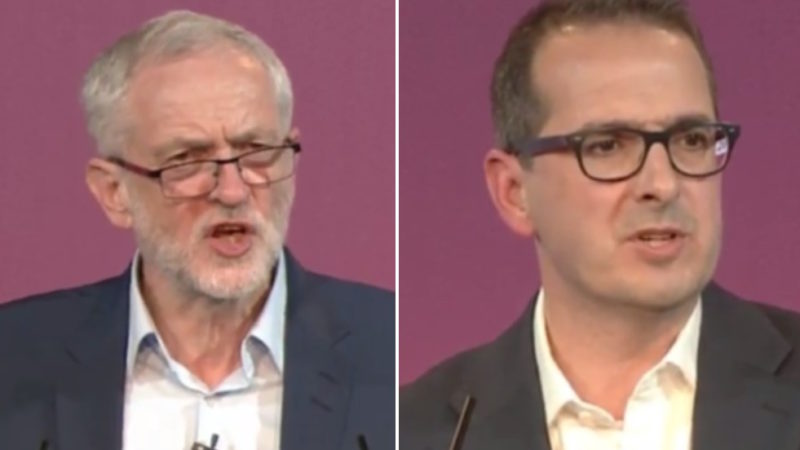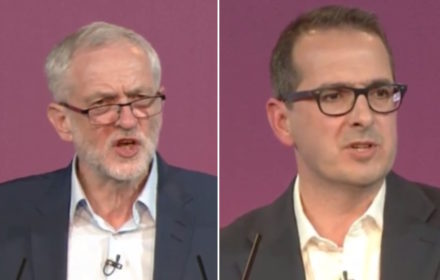

Two weeks ago, the Tories’ scrapping of maintenance grants for the poorest students came into force. The government described it a means of ensuring that higher education is funded in a “fair and sustainable way”. At a time when they are also cutting funding for further and adult education, gutting the comprehensive school system, and preparing university reforms that will unleash private sector vultures onto the sector, it could be more plausibly described as an act of naked class war. Meanwhile, private schools have further extended their lead in university progression rates over their state counterparts.
In the face of this onslaught – the latest in a series of attacks across decades – we need a Labour Party willing to lead a counterattack, equipped with a bold alternative vision. So the current contest for the Labour leadership is crucial.
Owen Smith is keen to emphasise that he is just as radical as Corbyn. And while we have yet to see a full education policy offering from Smith, it is worth examining what is already out there from the perspective of wanting radical change in the education system.
Academies and Free Schools
The academy and “free school” policies have incrementally removed schools from local democratic accountability. They have sold control of education to private interests, religious and right-wing ideologues, and broken up collective bargaining for education workers’ pay and conditions. Jeremy Corbyn has been a consistent critic, saying last year that he “would want to bring them all back into the local authority orbit”. More recently he won rapturous applause at NUT conference, where he denounced academisation as “asset-stripping” and argued “there is not a shred of evidence that academies automatically improve standards”.
Owen Smith – while voting against the Conservatives’ expansions of New Labour’s academies policy and making some criticisms of Tory free school policies – has not recanted the support he expressed in 2006 for academies. Saying “If PFI works, then let’s do it…. I’m not someone, frankly, who gets terribly wound up about some of the ideological nuances”, Smith did not seem to think that allowing private control over schools and other public services would be an issue per se. He has yet to express any intention to bring these schools back into a democratically accountable framework.
University tuition fees
In last summer’s leadership contest, Corbyn’s first detailed policy announcement was to abolish tuition fees and restore maintenance grants. He explained that this could be funded progressively – by taxing corporations and the highest earners, not those who can least afford it. He and his close ally John McDonnell have long stood shoulder-to-shoulder with supporters of students and workers fighting to defend higher education, opposing every fee rise under both New Labour and the Coalition and appearing regularly at protests and picket lines.
What about Owen Smith? In the past, he’s criticised the Coalition’s increase of undergrad fees to £9000, but also endorsed the principle that students must “share the cost” of education. If he’s had a Damascene conversion since then, he’s kept awfully quiet. It is difficult to find any comments from Smith on the record about tuition fees or higher education funding other than these.
Further education and a vision for systemic reform
Last summer, Jeremy Corbyn went beyond condemning the Conservatives’ brutal cuts to further and adult education. Corbyn promises provision for lifelong learning, minimum wage equalisation to end poverty rates for apprentices, and integration, cooperation and democratic accountability across education. This is a stark departure from decades of Conservative (and New Labour) policies attempting to force education into an artificial market.
Significantly, Corbyn’s pledge also includes universal public childcare – a policy that would both raise the prospects of children from disadvantaged backgrounds, and remove barriers and burdens that disproportionately fall on women.
We have yet to see a comprehensive policy from Smith – though of course one may follow in the coming weeks. His 20 policy pledges go no further on education than “greater spending on schools and libraries”. The test that has been set for Smith, however, is not just about how much money he can push into the system or into the pockets of students. It is about grand vision. Corbyn’s proposal for a cradle-to-grave National Education Service, free to all and funded by taxing those who can afford it, would be transformative.
A clear choice
Owen Smith has been insistent in this contest that his differences with Corbyn aren’t about political vision but about competence and clarity. For many members, deciding how they vote will come down deciding how credible this claim is.
On education, I would suggest it isn’t.
Ben Towse is an organiser for the National Campaign Against Fees and Cuts and a postgraduate activist in NUS and UCU




More from LabourList
‘Labour won’t stop the far right by changing leaders — only by proving what the left can deliver’
‘Cutting Welsh university funding would be economic vandalism, not reform’
Sadiq Khan signals he will stand for a fourth term as London Mayor